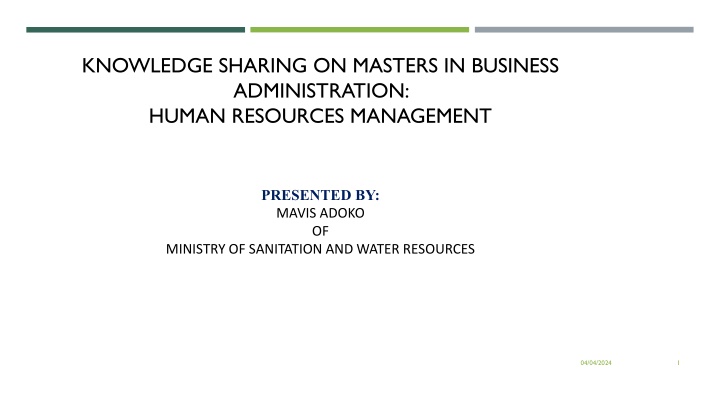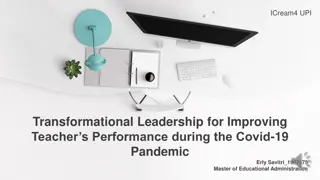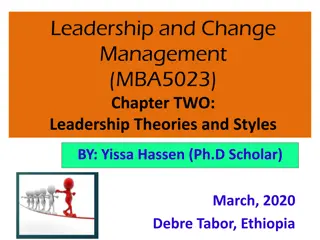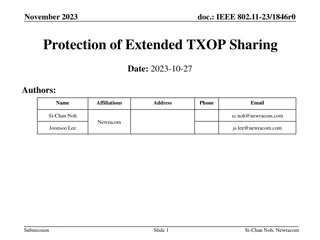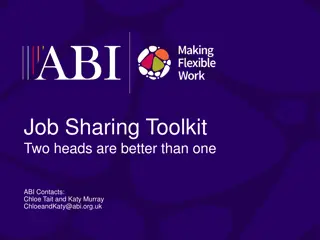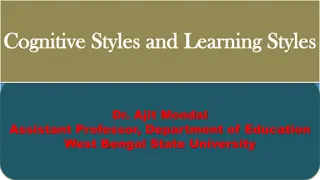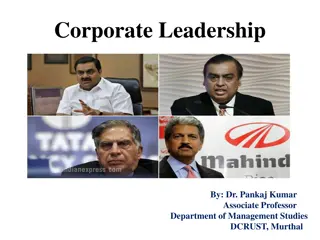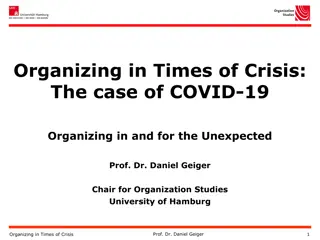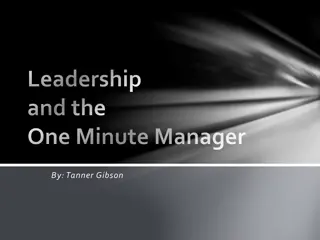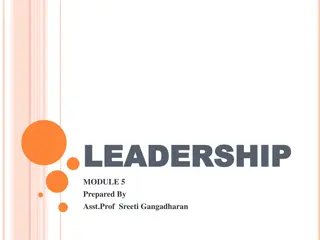Knowledge Sharing on Leadership Styles and Employee Performance During Pandemic Crisis
Mavis Adoko of the Ministry of Sanitation and Water Resources presents a knowledge-sharing session on her Master's thesis focusing on leadership styles and employee performance during the Covid-19 pandemic. The study explores various leadership styles' impact on employee performance, challenges faced by employees, and managerial leadership mechanics during crises.
Download Presentation

Please find below an Image/Link to download the presentation.
The content on the website is provided AS IS for your information and personal use only. It may not be sold, licensed, or shared on other websites without obtaining consent from the author.If you encounter any issues during the download, it is possible that the publisher has removed the file from their server.
You are allowed to download the files provided on this website for personal or commercial use, subject to the condition that they are used lawfully. All files are the property of their respective owners.
The content on the website is provided AS IS for your information and personal use only. It may not be sold, licensed, or shared on other websites without obtaining consent from the author.
E N D
Presentation Transcript
KNOWLEDGE SHARING ON MASTERS IN BUSINESS ADMINISTRATION: HUMAN RESOURCES MANAGEMENT PRESENTED BY: MAVIS ADOKO OF MINISTRY OF SANITATION AND WATER RESOURCES 04/04/2024 1
OUTLINE Introduction / Background Statement of the Problem Research Question Research Objectives Methodology Key Findings Lessons learnt Practical Implications Conclusion 2
INTRODUCTION The Office of the Head of the Civil Service, through the Ministry of Sanitation and Water Resources granted me permission in 2020 to pursue a Master s Degree in Business Administration with a specialization in Human Resource Management. The duration of the study was 2 years. The major goal of the presentation is to give an account of the knowledge l gained and how it will be effectively applied on the job as an Officer in the Service and to keep up with the shifting trends so I can continue to be relevant in making inputs into the strategic focus areas in the Civil Service. This knowledge sharing session is based mainly on my research work / thesis of the Masters Programme titled: LEADERSHIP STYLES AND PERFORMANCE OF EMPLOYEES DURING COVID 19 PANDEMIC 04/04/2024 3
STATEMENT OF THE PROBLEM At present, numerous studies are concerned with the effective management of employee stress during the current Covid -19 crisis. Some studies have focused on strategies for a work-life balance through, for example, effective teamwork management to improve employee performance Other studies have placed leadership at the centre of effective employee management during a pandemic crisis, particularly in the contexts of authentic, pain management, responsible and inclusive leadership styles among others. To expand the research further to employee performance during pandemic, this study investigated how managerial leadership mechanics can help improve employees performance during the Covid -19 pandemic to ascertain the leadership style that best works during pandemic or crisis. 04/04/2024 4
RESEARCH QUESTIONS 1. What are the leadership styles exhibited by the managers? 2. How do these leadership styles affect the performance of the employees? 3. What are the challenges faced by employees due to the leadership style exhibited by their managers or supervisor? 04/04/2024 5
OBJECTIVES 1. To identify the leadership styles exhibited by managers during Covid 19 pandemic 2. To examine how these leadership styles affect the performance of the employees during these tough times. 3. To identify the challenges faced by employees due to the leadership style exhibited by their managers or supervisor. 04/04/2024 6
THEORETICAL FRAMEWORK / LITERATURE REVIEW Leadership Theories: Transformational Leadership Theory: Transformational leadership theory asserts that effective leadership are the result of a positive relationship between leaders and team members. They motivate and inspire through their enthusiasm and passion. Based on the analysis, it emerged that the respondents confirmed the existence of transformational leadership style. Transactional Leadership Theory: Transactional theory of leadership, is a system of rewards and penalties. It views effective leadership as results-focused and hierarchy. Empirical Studies: the session reviews the empirical studies that investigate the influence of transformational and transactional leadership styles on employee performance, in addition to the theories that guide the current study. 7
METHODOLOGY The study adopted: The quantitative approach. The convenience sampling technique Sample size of 60 non-management staff. The questionnaire prepared based on the guidance of the research objectives. Validity and ReliabilityTest 04/04/2024 8
KEY FINDINGS 1. To identify the leadership styles exhibited by managers during Covid 19 pandemic: Based on analysis of the findings, it emerged that the respondents confirmed the existence of transformational leadership style, for instance the respondents strongly affirmed the statement that managers or supervisors have leadership skills that build their respect. 2. To examine how these leadership styles affect the performance of the employees during these tough times: Based on the analysis of the findings, it was revealed that there is acknowledgement/appreciation of staff efforts and mentoring to those who need help through career advancement, and this has improved performance of the employees. Again, managers ensured that there exists good working relation among co-workers. 04/04/2024 9
KEY FINDINGS CONT. 3. To identify the challenges faced by employees due to the leadership style exhibited by their managers or supervisor. The results revealed that the managers or supervisors keeping their subordinates happy and involved often interferes with high achievement and causes the subordinates to lose respect for their leaders. The study further revealed that anytime managers or supervisors guide their subordinate on what to do, it often leads to time consuming. 04/04/2024 10
LESSONS LEARNT TRANSACTIONAL LEADERSHIP Pros of transactional leadership Cons of transactional leadership Success is clearly defined. Diminished creativity and innovation Expectations and job roles are clear. Reduced collaboration and communication between team members Identify problem areas or low-performing employees quickly. Reduced team morale Individual employees are motivated to compete and succeed. Increased employee conflict and higher employee turnover High-performing employees are consistently rewarded. Nothing can be completed without the leader s approval 04/04/2024 11
LESSONS LEARNT TRANSFORMATIONAL LEADERSHIP Cons of Transformational leadership Pros of Transformational leadership Prioritizes long-term goals over short-term goals Promotes motivation Maintains workplace integrity Can lead to employee burnout Defines a clear vision and goal Can be risky and disruptive Encourages professional development Carries a high potential for abuse Improves communication Leaders lose power if people disagree with them 04/04/2024 12
PRACTICAL IMPLICATIONS Both Theories Typically, the transactional leadership style is appropriate when the employees' task requires strict adherence to rules and regulations. While transformational leadership style works well when the task requires creativity and innovative ideas to complete. Transactional Theory: Discipline ensures productivity and efficiency. It encourages harmony and co-operation among employees as well as act as a morale booster for the employees It allows employees to learn and adapt to meet expectations Creates essential for a healthy industrial atmosphere and the achievement of set goals and targets Transformational Theory: The need for the managers to continue to motivate employees so as to improve on productivity while drawing a limit as to how they open up to their subordinates to minimize possible attitude of disrespect on the part of some of the employees. 04/04/2024
CONCLUSION From the perspective of the contemporary leadership theory, I will suggest that Management in the Civil Service ensure that there is cohesiveness between employees and their supervisors, simultaneously always promoting employees morale to achieve set goals. This therefore calls for management establishing strategies that meet employees motivation and not only those of government. l wish to once again express my profound gratitude to the Office of the Head of the Civil Service for granting the study leave as well as this platform to share the knowledge acquired and contribute to the availability of information others can use to improve their performance in the Service. 04/04/2024 14
THANK YOU 04/04/2024 15
